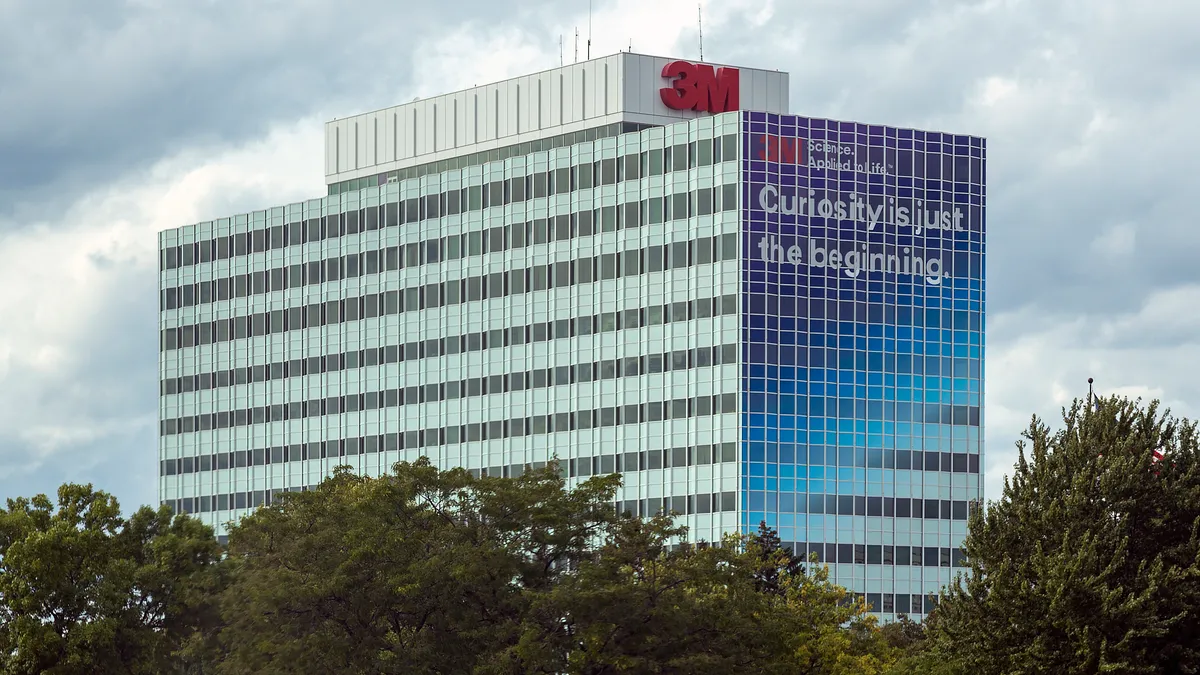Dive Brief:
- Manufacturing giant 3M has agreed to a $6 billion deal with plaintiffs counsel to settle the largest mass tort case ever, the company has announced.
- Under the agreement, 3M will contribute $6 billion between 2023 and 2029, which is structured to include $5 billion in cash and $1 billion in 3M common stock.
- The agreement is not an admission of liability, the company says. “The products at issue in this litigation are safe and effective when used properly,” the company says. “3M is prepared to continue to defend itself in the litigation if certain agreed terms of the settlement agreement are not fulfilled.”
Dive Insight:
Over the past several years the company has paid out about a quarter of a billion dollars in individual lawsuits and by some estimates was expected to face as much as $15 billion to cover its liability.
Based on earlier reporting of the settlement, Carl Tobias, a University of Richmond law professor, said the terms looked relatively good for the company in light of the liability it could face were all the cases to go to trial.
“Sounds like 3M negotiated a pretty good deal for itself, given this litigation has been weighing on them for the better part of a decade,” he told Bloomberg Law.
The earplugs are designed for the battlefield by helping to block noise from gunfire and explosions while enabling service members to talk to one another.
3M bought the manufacturer, Aearo Technologies, in 2008, and a decade later paid $9.1 million to the U.S. government to resolve a claim by the Department of Justice the earplugs would loosen while in use without the service members being aware of it, putting their hearing at risk.
The company says the earplugs work as intended if they’re worn correctly, but it has had trouble convincing juries of that. In 16 bellwether cases that have gone to trial so far, plaintiffs have won 10 while the company has won six.
The deal comes after the company tried and failed to use a novel strategy to limit its liability by consolidating all of the cases in 2021 under Aearo and having that company work out a court-approved settlement as part of a bankruptcy reorganization.
U.S. Bankruptcy Court Judge Jeffrey Graham in Indianapolis, where Aearo is headquartered, threw cold water on that strategy when he said Aearo can’t reorganize under the bankruptcy code since it’s financially healthy and 3M has agreed to pay whatever settlement amount is negotiated.
“Allowing an otherwise financially healthy debtor with no impending solvency issues to remain in bankruptcy, much less one whose liability for most of its debt is supported by an even more financially healthy, Fortune 500 multinational conglomerate, exceeds the boundaries of the court’s limited jurisdiction,” Graham said in his ruling.
Johnson & Johnson has tried the same maneuver in its effort to limit liability in some 30,000 tort lawsuits from consumers who say the company’s talc powder caused their cancer. The judge in that case also denied the company’s subsidiary, called LTL Management, from using the bankruptcy code to negotiate a settlement since J&J was prepared to pay the settlement amount.
3M still faces massive tort liability in a separate matter from its use of so-called forever chemicals, or PFAs, in some of its products. The company faces an estimated $12.5 billion in liability from state attorneys general and individuals who have sued the company on the grounds the chemicals pose a health danger. The company has said it’s phasing out its use of the chemicals.











